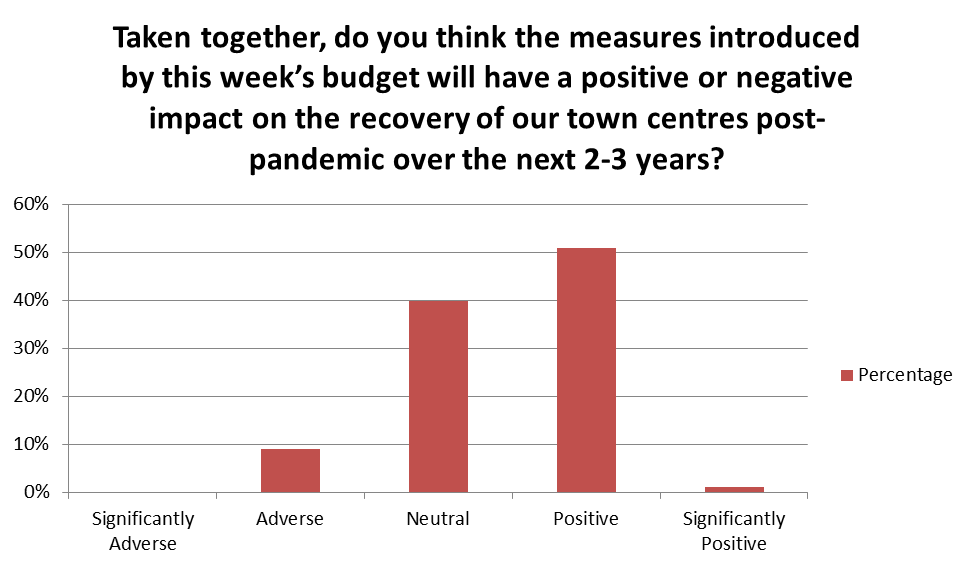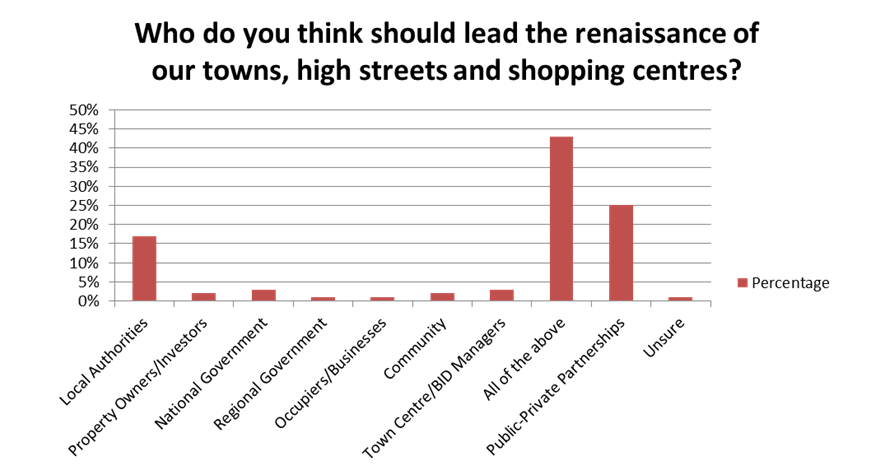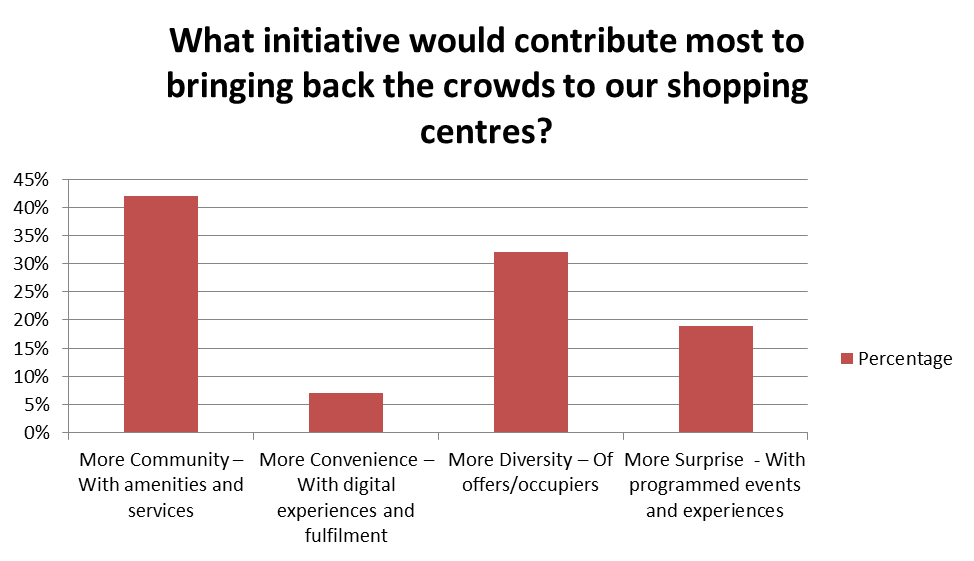Lambert Smith Hampton (LSH) and Revo hosted a webinar on Friday 5th March, entitled ‘What next for our town centres, shopping centres, and high street?’. Following on from our online survey conducted at the end of 2020 and the research paper published in early 2021, the event attracted over 500 attendees; ranging from local authorities and town centre managers, to owners, occupiers and investors.
The webinar provided great insight, creative foreword-thinking and optimism for the future recovery and renaissance of our towns and shopping centres following the damaging impacts of the pandemic on our economy, households, businesses and society in general.
Following a brief introduction by Revo’s Vivienne King, Dr Steven Norris (LSH’s National Head of Planning, Development and Regeneration) presented some of the headline research findings on the key issues and challenges facing our towns, and opportunities for future recovery and growth.
Click here to watch Vivienne's introduction to Revo.
This was followed by a Q&A panel discussion featuring high profile guests from both the public and private sectors:
- Mark Robinson - Co-Founder of Ellandi and Chair of the Government's High Street Task Force
- Michelle Percy - Director of Place - Newcastle City Council
- Kate Nicholls - CEO - UKHospitality
- Ojay McDonald - CEO - Association of Town & City Management
- Ibrahim Ibrahim - Managing Director - Portland Design
The LSH/Revo webinar was also the first major town centre focussed event hosted after the Government’s budget on Wednesday 3rd March. The panellist’s thoughts on whether the Chancellor has done enough to support the recovery of our towns, businesses and economy are well worth listening to! Please follow the link below to access the recording.
Click here to access the webinar recording.
We also thought it would be helpful to provide you with a snapshot of some of the key talking points!
Reasons for optimism?
In a year where the term ‘doomscrolling’ has become a household term rather than something only known by dictionary corner on Countdown, a lack of optimism about the future of our town and shopping centres could be forgiven. However, in a live poll conducted during the webinar, half of attendees indicated that they were either ‘optimistic’ (49%) or ‘very optimistic’ (2%) about what the future holds.

So what underpins this optimism?
Co-founder of Ellandi and Chair of the Government’s High Street Task Force, Mark Robinson, claimed that “we have fallen out of love with our high streets” and this has been accelerated by the pandemic. He stated that the crisis facing our high streets is now so “deep and drastic” it can no longer be ignored.
This was supported by Director of Place at Newcastle City Council, Michelle Percy, who argued that because “the face of retail has changed” we need to promote more attractive and “sustainable places”.
The pandemic has also inevitably focussed minds on the nation’s health and well-being. Chief Executive of the Association of Town & City Management (ATCM), Ojay McDonald identified the “introduction of blue and green infrastructure” in our towns as critical; the greening and rewilding of centres and places will not only help to tackle the climate crisis, but will also have a positive benefit for health and well-being.
It is clear that significant challenges lie ahead for our towns and shopping centres; but there are also opportunities to create real change for better, more sustainable and more diverse futures. This generated a general mood of optimism amongst the panellists and attendees.
Budget: The good, bad, and the ugly
Over half of attendees felt that the budget announced by Chancellor Rishi Sunak will have a ‘positive’ (51%) or ‘significantly positive’ (1%) impact on the recovery and renaissance of our town centres post-pandemic.

This was supported by panel member and CEO of UKHospitality Kate Nicholls OBE who recognised that for the third budget in a row, there was a real recognition of the crisis facing our towns and city centres that has been accelerated by the pandemic.
Mark Robinson referred to the announcement in the budget of the first 45 out of 101 towns that are to receive over £1bn of Towns Fund money as a positive step. He added that it was “good to see proper funding coming through”, but more is going to be needed.
This positivity was echoed by Ojay McDonald, who cited Covid-19 as the trigger of a “change in mindset” from the government.
Despite the general positivity in the “virtual room”, Kate Nicholls felt that the budget announcement totally overlooked rent debts, claiming that there is “no solution to get us out of the rent crisis.”
This was supported by Ojay, who said that he had “seen nothing in the budget that addresses [debt]” and that if we were to have “any economic issues in the next few years that extend our current crisis, then we have got a problem.” He added further that the problem of debt is wide ranging where there is ultimately “a potential chain with money owing to commercial landlords, commercial landlords owing to banks, alongside issues with pension funds, and it is a challenge.”
The need for partnerships and funds
Dr. Norris asked the panel members the critical question of who is going to lead and fund the town centre renaissance?
An overwhelming 43% of respondents felt that it required a collaborative approach between all key stakeholders. A further 25% of respondents also supported the need for public-private partnerships.

This was supported by Ojay who said “it isn’t important where the leadership comes from, it doesn’t matter whether it is from public, private, or even civic sectors. The issue is the skills and ability of that leadership to work with others to get the best out of others.”
Director of Place at Newcastle City Council, Michelle Percy, added that “the local authority needs to establish and drive the ambition but [they] can’t do it alone”, as local authorities cannot be “experts in all areas”. Instead, she stated that they must “work in partnership with the private sector to establish the right level of expertise”.
In response to the question “how are we going to fund the renaissance of our towns, high streets and shopping centres?”, Mark Robinson commented that: “The taxation of commercial real estate, is wrong. The way that insolvency works in real estate, is wrong. The way that we lease property, is wrong. If we do not sort out those things, the international investors and bankers will not want to invest into our town centres.”
Mark also made reference to the report into the Levelling Up fund by Sir Bob Kerslake, citing huge disparities in cost between the government’s proposed funding and the money spent by the German government in their re-unification programme.
The future of shopping centres
The question was also posed “what initiative would contribute most to bringing back the crowds to our shopping centres?” and “what will shopping centres ‘look and feel’ like in 2030?”

The responses to the poll were varied (see figure). Ibrahim Ibrahim (Managing Director at Portland Design) stated that “the main problems with shopping centres are the word ‘shopping’ and the word ‘centres’!” He identified the following four key factors that he believed would help “save” some of our shopping centres from extinction:
- A shift in focus
- The typology of a shop
- Architecture as a by-product
- A people revolution
Flexible leases
The word ‘flexible’ has also become part of the everyday vocabulary as a result of the pandemic. Whether it be the change to the ways of working, the change to the way we live our daily lives, or the need for more flexible space in our towns and shopping centres to help maintain their vitality and viability.
But this notion of flexibility has not necessarily spread to the traditional rent and lease models.
In response to our online poll some 90% of respondents either “strongly agreed” or “agreed” that more flexible leasing models were needed to support town and shopping centre recovery.

Mark Robinson explained that “the fact that [retail property] values have fallen so much does mean greater opportunities to replace them with more suitable and better community uses”. He described a “successful place” as looking “more like the 1920s than the 2010s”.
Occupancy costs and debt: the case of the black swan and grey rhinoceros
Earlier in the discussion on the budget announcement, Kate Nicholls touched on the issue of debt. Probed further by Steve Norris, she enlightened the audience on the issue of ‘the black swan and the grey rhinoceros’.
Kate described how “we have survived the black swan of Covid but it is the grey rhinoceros of debt that is going to take down many in the industry unless we get it right over the next 18 months to 2 years.” She called for the government to “stop kicking the can down the road” and instead put into place a re-capitalisation strategy to allow businesses to survive. Supporting this with reference to her own sector; she claimed that “just in hospitality, you have £2 billion worth of rent debt that is falling due before the sector is able to re-open.”
Kate also concluded by calling for a “fundamental root and branch review” of the business rates regime that was set in the 1980’s. There is an active campaign that is running for retail, through the Shopkeepers Campaign now under the auspices of the BPF (one of our other partners in the recent research).
Conclusion
In conclusion, there was a general mood of optimism amongst the panellists and those tuning in to the webinar on the future recovery of our town and shopping centres.
The Covid-19 pandemic has clearly accelerated many of the underlying trends and market forces that have been impacting on our towns, high streets and shopping centres for more than a decade; but as we emerge from its “dark shadow” it also provides us with an opportunity to reposition, repurpose and reimagine the future of the places where we live, work, shop, play, study and visit.
It is also clear that the recovery and renaissance of our towns, high street and shopping centres needs to be achieved through the power of partnerships and by working together towards a shared vision and strategy, supported by the right level of expertise, leadership and funding.
There is a lot of work to be done over the coming months and years, and the challenges are significant, but not insurmountable.
Finally, we would once again like to thank our fabulous panel members and all who attended our webinar.
Due to positive feedback, we are looking to set up a follow-up event in the autumn of this year.
Click here to access the webinar recording.
Get in touch


Email me direct
To:
REGISTER FOR UPDATES
Get the latest insight, event invites and commercial properties by email







